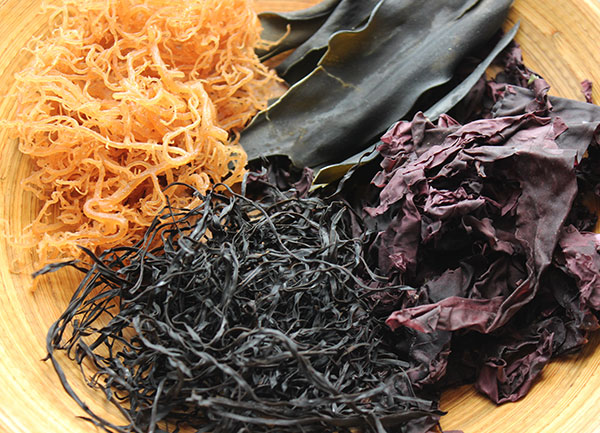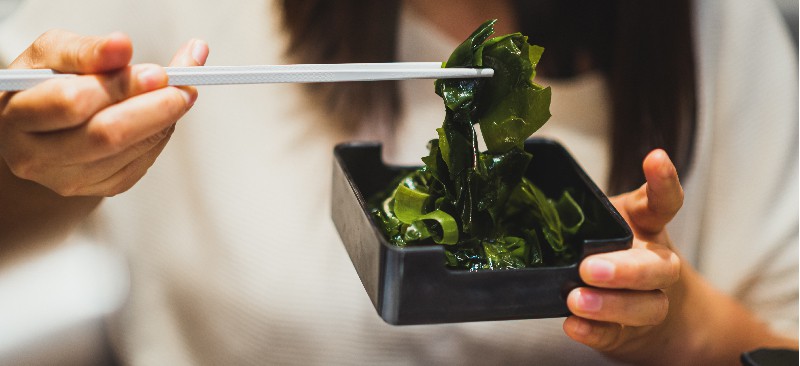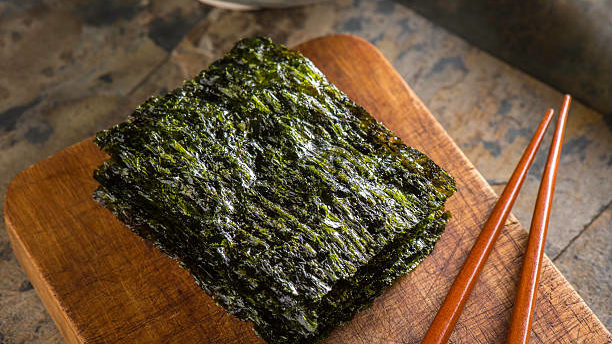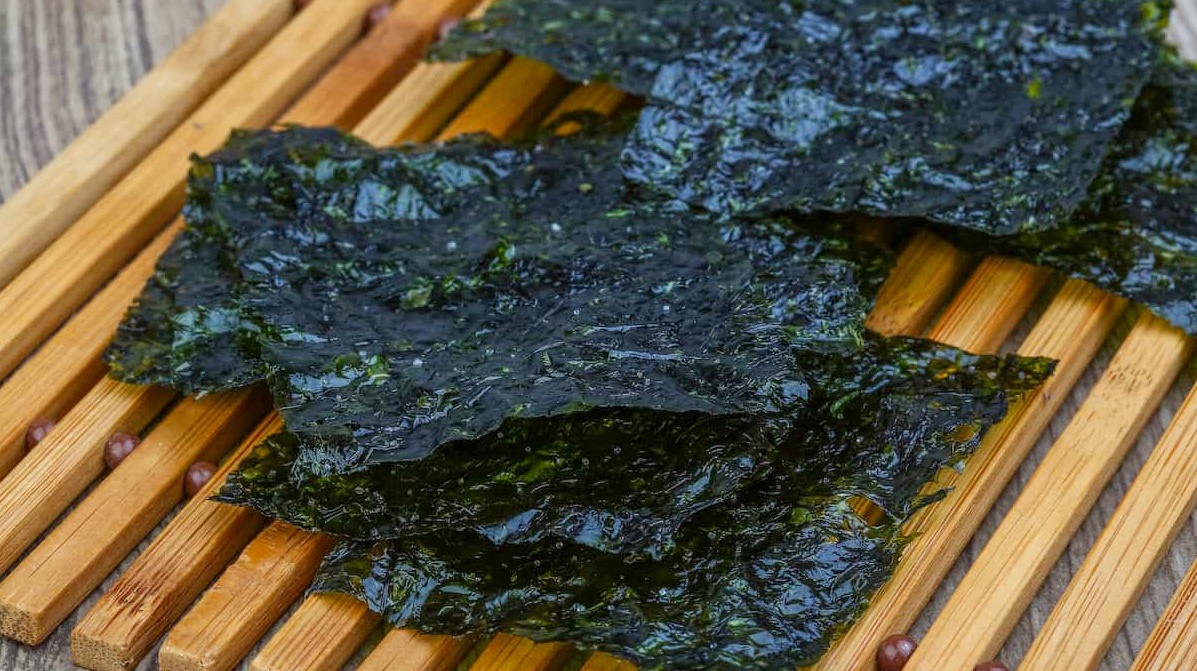Though seaweed snacks are available worldwide, these treats from the ocean definitely seem to be more ubiquitous in Asia. Supermarkets in Kuala Lumpur always have plenty of varied packets on hand, many imported from Japan and Korea, but with plenty also hailing from Thailand, Vietnam, and China, too. You can go with the unflavoured style, sheets of dried nori that is minimally processed or seasoned, or choose from tantalising varieties like wasabi, grilled squid, chilli, and even a habanero pepper flavour! And of course, you can eat seaweed in its non-dried forms, too, as part of a cooked or fresh, raw meal. And what sushi dinner would be complete without seaweed?
So is seaweed healthy? Is it a good, versatile snack choice? Is it nutritious? Can you overdo it when munching on it? According to experts, the answer to all of these questions – including the last one – is ‘yes’. One of the better published accounts of the benefits of seaweed is a science-heavy, fact-based article from Healthline Media. Just like a good Wikipedia article, all the information comes with evidence-based citations, so read (and eat) in good health! Here are six reasons why seaweed is really, really good for you.

1. Seaweed contains iodine and tyrosine, both of which support thyroid functions.
Your thyroid gland releases hormones to help control growth, energy production, reproduction, and the repair of damaged cells in your body, and it depends on iodine to do its job. Without iodine, which your body cannot synthesise on its own, you may experience weight changes, fatigue, and swelling of the gland itself. (This is a chief reason why commercial salt producers started adding iodine to table salt in the 1920s.)
The recommended daily intake (RDI) for iodine is 150mcg. Since seaweed has a tremendous ability to absorb and store iodine (and other nutrients) from the sea, it’s a natural choice. But the iodine content in seaweed can vary dramatically among different types, from a paltry 11% of the RDI (per dried sheet) to 1,989% of the RDI! A gram of nori, for example, contains 25% of the RDI, while the less-common kombu delivers nearly 1,700% of the RDI. So check that nutritional label to see what you’re getting.
Seaweed also contains concentrated amounts of tyrosine, an amino acid that your thyroid gland needs, along with iodine, to function properly.

2. It’s also a great source of vitamins and minerals.
Every different type of seaweed has a different composition, and so delivers a unique set of nutrients. But it’s safe to say that, regardless of which seaweed you choose, you’ll get a nutritional boost. Crunching up dried seaweed and sprinkling it on your meals not only adds taste and texture, it also supercharges your intake of vitamins and minerals.
A single tablespoon of spirulina (about 7g), for instance, provides:
- Calories: 20
- Carbs: 1.7 grams
- Protein: 4 grams
- Fat: 0.5 gram
- Fiber: 0.3 grams
- Riboflavin: 15% of the RDI
- Thiamin: 11% of the RDI
- Iron: 11% of the RDI
- Manganese: 7% of the RDI
- Copper: 21% of the RDI
Seaweed also contains small amounts of vitamins A, C, E and K, along with folate, zinc, sodium, calcium, and magnesium. While it may only contribute a tiny percentage of some of the RDIs above, using seaweed as a snack or a seasoning once or twice per week can be an easy way to add more nutrients to your diet. Additionally, the protein present in some seaweeds, such as spirulina and chlorella, contain all of the essential amino acids. This means seaweed can help ensure you get the full range of amino acids.
Seaweed can also be a good source of omega-3 fatty acids and vitamin B12, though there is some debate over whether or not your body can usefully absorb the vitamin B12 in seaweed.

3. Seaweed contains a range of protective antioxidants.
Antioxidants work to make unstable substances that are in your body (called “free radicals”) more stable and less reactive, which it turn makes them less likely to damage healthy cells.
Seaweed fares quite well here. In addition to containing the antioxidant vitamins A, C and E, seaweed boasts a wide variety of beneficial plant compounds, including flavonoids and carotenoids. Like antioxidants, these have been shown to protect your body’s cells from free radical damage.
A great deal of research in the last few years has focused on one particular carotenoid called fucoxanthin. It’s the main carotenoid found in brown algae (such as wakame), and it has 13.5 times the antioxidant capacity as vitamin E. Fucoxanthin has also been shown to protect cell membranes better than vitamin A.

4. It’s also high in fibre and polysaccharides, which supports your “gut health.”
Though not something we often think about, gut bacteria play an enormous role in our health. In fact, it’s believed that we have more bacteria cells in our bodies than human cells! An imbalance in these “good” and “bad” gut bacteria can lead to sickness and disease, so maintaining and supporting good gut health is incredibly important.
Fibre can make up from 25 to 75% of seaweed’s dried weight, so it’s a significant amount, higher than most fruits or vegetables. Fibre is important for reasons that, again, we don’t usually think of. It actually resists digestion, thus serving as a source of food for our “good” gut bacteria (in the large intestine), which in turn leads to good health.
Additionally, seaweed has certain sugars called sulfated polysaccharides that increase the production of short-chain fatty acids. That’s good because it helps to provide support and nourishment to those “good” bacteria which line the inside of your digestive system, helping them to maintain healthy numbers.
The other good thing about all this fibre is that it slows down the process of emptying your stomach and contributes to a feeling of fullness, while adding minimal calories to your diet. So you feel fuller for longer, hunger pangs are delayed, and may even experience weight loss because of the fibre and the aforementioned fucoxanthin, as it has been shown to increase the expression of a protein that metabolises fat.

5. Seaweed may lower blood cholesterol levels and reduce heart disease risk.
Studies are ongoing, but there’s a lot to suggest that seaweed can aid in lowering blood cholesterol levels, a prime factor contributing to heart disease, which is the leading cause of death worldwide. In a study involving rats with high cholesterol, those which had a diet supplemented with 10% freeze-dried seaweed had 40% lower total cholesterol, 36% lower LDL (the “bad”) cholesterol, and 31% lower levels of triglycerides.
Studies have also suggested that seaweed in the diet can reduce blood pressure and the incidence of blood clots, though large-scale human trials are not yet complete.

6. Finally, seaweed can help control blood sugar and possibly reduce diabetes risk.
People with diabetes are unable to balance their blood sugar levels over time; this is a major human health problem, with some 642 million people worldwide expected to have type 1 or type 2 diabetes by 2040.
Back once again to the compound in seaweed that’s getting so much attention, fucoxanthin, a study in Japan is showing signs that this is what’s responsible for the apparent tendency for seaweed to improve blood sugar control. The small-scale study, involving 60 Japanese adults, showed signs that fucoxanthin aided in balancing blood sugar levels.
The study also noted additional improvements in blood sugar levels in those with a genetic disposition to insulin resistance, which often accompanies type 2 diabetes. And if that weren’t enough, another substance in seaweed called alginate actually prevented blood sugar spikes in animals after they were fed a high-sugar meal. Researchers believe that alginate may reduce the absorption of sugar into the bloodstream.

The potential downsides
Although it’s increasingly clear that seaweed is a very healthy food – a so-called “superfood” in fact – there are potentially some risks associated with consuming too much.
Seaweed can actually contain harmful levels of iodine. Interestingly, however, the health and longevity of Japanese people is attributed in part to the high intake of iodine as part of their usual diets. Why the apparent contradiction?
Though the intake of iodine in Japan averages from around 700 to 2,000% of the RDI, in many Asian cuisines (including Japanese), seaweed is typically eaten as part of a meal along with other foods that actually work to inhibit the uptake of consumed iodine by the thyroid gland. Foods such as bok choy, cabbage, some leafy Asian greens, and broccoli are all high in something called goitrogens, which mitigate the impact of excessive iodine intake.
Seaweed is quite efficient at absorbing and storing minerals found in the sea, often in concentrated amounts by the time of harvest. If toxic heavy metals are among what’s absorbed, it could potentially pose a health risk. However, studies carried out on this matter have shown that the risk is minimal. In fact, a recent study analysed the concentration of 20 metals in eight different seaweeds collected from Asia and Europe. It found that the levels of cadmium, aluminum, and lead found in four grams of each seaweed did not pose any serious health risks.
Heavy metals can accumulate in the body over time, though, so for now, experts say that to get the optimum health benefits seaweed offers, enjoy it regularly, but in modest amounts. Since many forms of this tasty, crunchy oceanic superfood are readily available in Malaysia, it’s a great choice to add to your diet!

"ExpatGo welcomes and encourages comments, input, and divergent opinions. However, we kindly request that you use suitable language in your comments, and refrain from any sort of personal attack, hate speech, or disparaging rhetoric. Comments not in line with this are subject to removal from the site. "



















